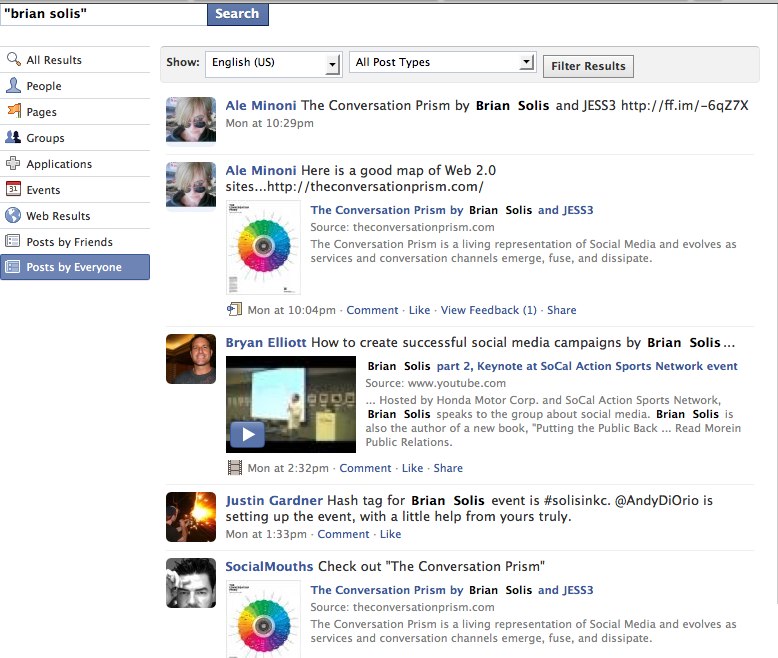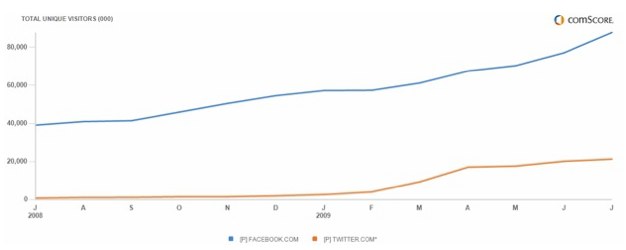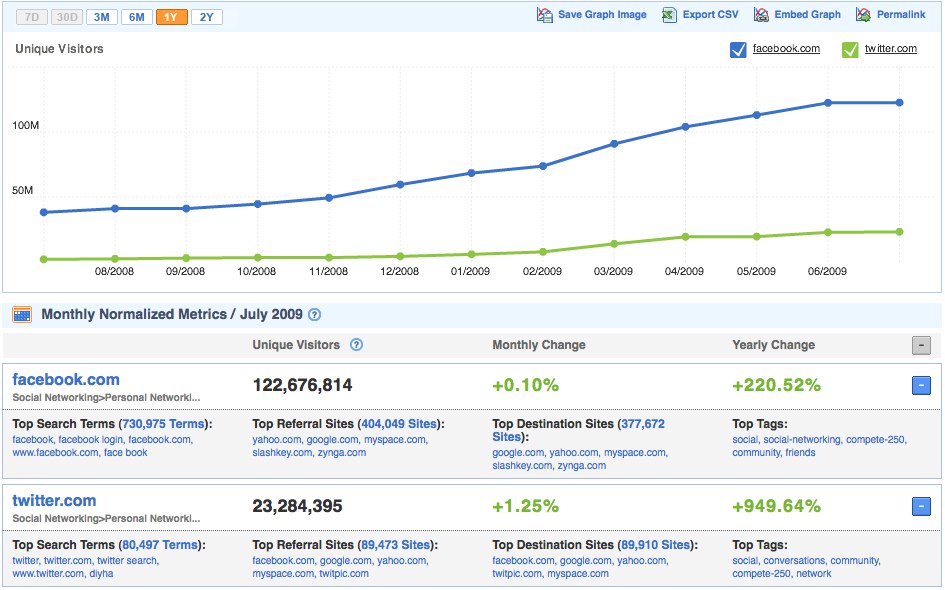For years, Facebook and Twitter have maintained a friendly coopetition of sorts, with neither one taking a firm stance against the other. However, if you believe that Mark Zuckerberg does not actively contemplate strategies for either acquiring Twitter or rendering it obsolete, please think about the landscape and monetization drivers that aren’t yet readily apparent to us as everyday consumers. This may seem like the “Social Media Summer of Love,” but in the end, there are billions of dollars and users at stake here.
I believe that eventually, explicitly or implicitly, consumers will face a decision as to which platform will host their native social OS. It’s akin to the Mac vs. PC rivalry in a way. These systems naturally coexist, however, each represents unique and diverse lifestyles and delineated beliefs, methodologies, and persona. We’re made to believe that we must make a choice, even though I actually use and enjoy both.
While some argue that a massive social network might eventually exist, I firmly believe that multiple networks will continue to attract our attention, enhanced by intelligent and semantic filtering. Technology will continue to adapt to human behavior, while being influenced by human nature’s unending contention to embrace and also change along with its evolution. It’s perpetually cyclical and each feed off each other. And, don’t forget, younger generations of digital consumers expect a more sophisticated and immersive experience than we crave or are able to process currently. One day, they’ll grow up and expect more than either Facebook or Twitter offer today.
No matter how much noise we hear or see about Twitter, the statistics defining Facebook’s meteoric rise is both blinding and deafening.
The race intentionally or unwittingly erupted when the ability to search Twitter unveiled the proverbial “conversation.” Since then, Facebook has maneuvered aggressively to preserve attention and loyalty. In many cases, it borrowed from the innovation sparked at pseudo Twitter competitor FriendFeed, integrating FriendFeed-like features such as individual activity streams, comments, and the ability to “like” updates. But, as you may have heard this week, Facebook acquired FriendFeed. And, the 250-million strong social network also rolled out its version of real-time search for not only scouring conversations weaving together the social graph, but also network-wide conversations that orbit relevant social objects (at least those who have designated their updates as viewable by everyone.

The next chapter is already unfolding as told by the acquisition of FriendFeed and the release of a more pragmatic version of its in-network search engine, which really only serves as a precursor for what I’m sure will be a more powerful and significant form of social, real-time search.
comScore released its latest traffic reports and the numbers paint an interesting picture.

According to the latest estimates from comScore, Facebook attracted 87.7 million unique visitors in July, which represents an increase of 14 percent over June. Twitter, on the other hand, lured 21.2 million visitors, symbolizing a swell of roughly 6 percent. In other words, Twitter added one million new visitors, whereas Facebook enchanted ten million. As a comparison, CNN.com drew a ballpark of 30 million unique viewers in June.
So, this is the part where you call in to question the stats as they never include the quantity of Twitter clients currently in use, they more accurately represent the number of visitors to Twitter.com. I should point out however, that these numbers also do not account for the Facebook Connect activity on other sites either.
As TechCrunch explained:
Note that these estimates are only for Twitter.com and do not include mobile or desktop clients such as Tweetdeck, Seesmic, or Tweetie, but it should be a good proxy for overall growth. Even if you double the numbers for Twitter, Facebook still trounced it in July.
Compete.com tells another tale.
In an email received from the Compete team, traffic analysis concludes that both Facebook and Twitter growth from June to July was basically flat. Notice the difference in estimates however. comScore pegs Facebook at 87 million whereas Compete approximates traffic at 122 million.
Erik Schonfeld of TechCrunch cites the release of the “everyone button” as a likely catalyst for Facebook’s latest wave of traffic. If you don’t already know about this feature, you should. It is this feature, combined with its evolving real-time search strategy, that will position Facebook directly against Twitter. The “everyone button” places the power of public publishing directly in the hands of the user. Normally, your updates are only viewable within your social graph, which has been an inhibitor for the scaling of personal and corporate brands. But now, we have the ability to define the extent and reach of our updates so that even those with whom we are not yet connected, can view and respond to our social objects. For the record, this feature is pretty powerful. It also goes “with saying” that Facebook can already host discussions around Tweets that are imported into the network today.
The race is on so to speak. And like any race, it will be well documented and dissected. More specifically, its unpredictable results will be readily and willfully hypothesized and publicly deliberated. While it’s premature to predict the end result, the cooperation between Twitter and Facebook will continue to serve as a healthy competition for sparking innovation inside the network and across the social Web.
This healthy and important tussle between Twitter and Facebook also carries significant impacts on human behavior as existing and new users are subconsciously conditioned, enticed, and emotionally and intellectually rewarded for digital extroversion.
Connect with Brian Solis on:
Twitter, FriendFeed, LinkedIn, Tumblr, Plaxo, Plurk, Identi.ca, BackType, Posterous, or Facebook
—
Kindle users, subscribe to PR 2.0 here.
—
Now available (click to purchase):
—
pr pr+2.0 pr2.0 public+relations marketing advertising interactive social+media socialmedia brian+solis social media media2.0 media+2.0 2.0 smo social+media+optimization marcom communication publicity advertising interactive spin brand branding









<!–StartFragment–>
Hi Brian,
Great post and I wanted to some thoughts regarding the collision course you mention seen from a brand management point of view.
While there are important distinctions between the technology and services that FB and twitter currently offer, I completely agree that they are headed for a collision course. I also believe friendfeed positioned themselves shrewdly to that end.
Despite friendfeed being a more appropriate acquisition for FB from a technology point of view (since twitter already has readers), it’s never ideal to let a rival own a piece of your real estate.
By allowing facebook to buy friendfeed, twitter lost a little of itself and facebook gained the expertise of their real time technology veterans. Plus this accelerated their headlong rush towards collision.
twitter currently owns the real time space and with facebook emulating them more and more within their own app, the last thing twitter wants is facebook owning an external real time app on which twitter lives.
I think twitter’s defense should match facebook’s offense in such a dynamic competition. And judging by the July numbers you mention above, twitter needs to redouble its efforts.
Thanks for your consistently great posts,
Simon
http://www.simonmainwaring.com/blog
<!–EndFragment–>
You know what they say? Every marketing catagory ultimately becomes a ‘two horse race’.
Jeff